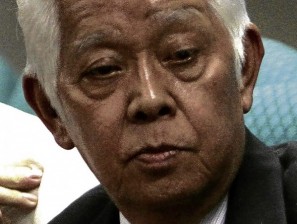MANILA, Philippines – There is no more time to review the source code of the Precinct Count Optical Scan (PCOS) machines even if it would be released soon, Commission on Elections (Comelec) chairman Sixto Brillantes Jr. said Monday.
“I’m no longer interested because it is too late and too close to the elections,” Brillantes told reporters Monday.
“Even if they give the source code it won’t be reviewed [because] there isn’t enough time, they kept changing their position,” he said.
The source code is the programming software of the PCOS machines that will perform the counting, canvassing and transmission of votes on Election Day.
Currently, a legal dispute in the United States between Smartmatic Inc., which is contracted by Comelec for the automated elections, and Dominion, which owns the PCOS machines and source code, is preventing the release and review of the source code.
Brillantes has been negotiating between the two for several weeks to try to get them to an agreement. At a certain point in the negotiations, Brillantes expressed optimism that the source code would be released so it could be reviewed by political parties and interested groups.
The negotiations, however, has yet to come to a conclusion.
“I don’t want it anymore, I already gave a deadline for that,” Brillantes said.
He said, however, that a source code review was not necessary.
“It is not needed to run the elections; the source code is only for the purposes of the political parties and interested groups so they won’t be too noisy,” he said.
Brillantes further said that back in the first automated elections in 2010, there was no source code review. “Nobody was invalidated, nobody was questioned. The critics are just noisy,” he said.
When asked what legal implications could crop up if there was no source code review, Brillantes said there was none.
“There are no legal implications, those who say there are, I challenge them to [prove it]. Because if there are legal implications then the 2010 elections should have been null and void because nobody reviewed the source code then,” Brillantes said.
“[It is only] important for credibility purposes [and] not for legality or legitimacy of the elections,” he said.
